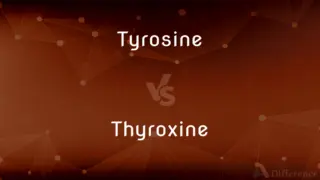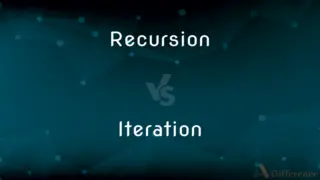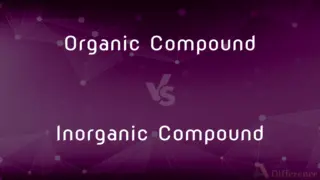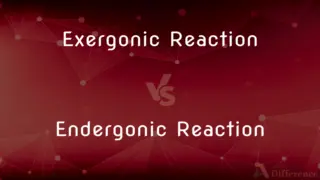Palpitate vs. Palpate — What's the Difference?
By Tayyaba Rehman & Maham Liaqat — Updated on April 16, 2024
Palpitate refers to a rapid, involuntary heartbeat often felt by the person experiencing it, suggesting emotional or physical responses, whereas palpate involves the act of examining or feeling something with the hands, primarily used in medical contexts.

Difference Between Palpitate and Palpate
Table of Contents
ADVERTISEMENT
Key Differences
Palpitate is used to describe the sensation of having a rapid, irregular, or fluttering heartbeat, often associated with anxiety, excitement, or health issues. On the other hand, palpate is a medical term that refers to the technique of examining body parts by touch, particularly to discern the consistency, texture, or other physical properties.
While palpitations can be felt by a person experiencing them and might indicate a symptom of a larger issue or a transient reaction, palpating is a deliberate action performed by someone, usually a healthcare provider, to diagnose or examine another person. Whereas palpitations are a subjective experience, palpation is an objective examination method.
Palpitations are often discussed in terms of their effects on one's well-being, sometimes causing discomfort or concern that leads to seeking medical advice. Conversely, palpation is a method that medical professionals use to gather information during a physical examination, helping to diagnose or check for an abnormality.
The term palpitate may be used metaphorically in literature to describe intense feelings or emotions, suggesting a deep emotional response that "quickens the heart." In contrast, palpate remains a technical term used strictly in clinical or professional settings without metaphorical extensions.
Individuals may experience palpitations due to a variety of factors including emotional stress, caffeine intake, or medical conditions like arrhythmia. Palpation, on the other hand, is utilized in various diagnostic contexts, such as checking for lumps in a physical exam or assessing the extent of an injury.
ADVERTISEMENT
Comparison Chart
Definition
Experience of a rapid or irregular heartbeat.
The act of examining by touch.
Context
Medical, often personal experience.
Medical, professional practice.
Purpose
Indicates a symptom or emotional response.
Aids in diagnosis or assessment.
Usage
Subjective feeling or sensation.
Objective, professional technique.
Metaphorical use
Used metaphorically to describe emotions.
Strictly clinical, no metaphorical use.
Compare with Definitions
Palpitate
To move with a rapid, trembling motion.
The bird's wings palpitated quickly as it hovered in place.
Palpate
To examine a part of the body by touch.
The doctor palpated the abdomen to check for any abnormalities.
Palpitate
To pulsate with unusual intensity.
The old engine palpitated under the strain of the heavy load.
Palpate
To assess the texture and consistency of bodily tissues.
During the exam, the vet palpated the dog's swollen leg.
Palpitate
To beat rapidly and irregularly.
Her heart began to palpitate as she stepped onto the stage.
Palpate
To explore physical properties through tactile feedback.
He palpated the sculpture to understand its texture.
Palpitate
To flutter, as with fear or excitement.
Her voice palpitated with emotion as she recounted the story.
Palpate
To diagnose or check health through touch.
The nurse palpated her wrist to find the pulse.
Palpitate
To shake or tremble.
He felt his hands palpitate with nervousness before the presentation.
Palpate
To apply hands-on examination techniques.
She palpated the patient’s lymph nodes to detect any swelling.
Palpitate
To move with a slight tremulous motion; tremble, shake, or quiver.
Palpate
To examine or explore by touching (an organ or area of the body), usually as a diagnostic aid.
Palpitate
To beat with excessive rapidity; throb.
Palpate
Having a palp or palps.
Palpitate
(intransitive) To beat strongly or rapidly; said especially of the heart.
When he just looks at me, my heart begins to palpitate with excitement.
Palpate
To examine or otherwise explore through touch, particularly (medical) in reference to an area or organ of the human body.
I palpated his expired heart.
Palpitate
(transitive) To cause to beat strongly or rapidly.
The allergy medicine palpitates my heart.
Palpate
Of palp, or having palp.
Palpitate
(intransitive) To shake tremulously
Palpate
To examine for medical purposes by touching, as of body parts; as, the nurse palpated the patient's stomach.
Palpitate
To beat rapidly and more strongly than usual; to throb; to bound with emotion or exertion; to pulsate violently; to flutter; - said specifically of the heart when its action is abnormal, as from excitement.
Palpate
Examine (a body part) by palpation;
The nurse palpated the patient's stomach
The runner felt her pulse
Palpitate
Cause to throb or beat rapidly;
Her violent feelings palpitated the young woman's heart
Palpitate
Shake with fast, tremulous movements;
His nostrils palpitated
Palpitate
Beat rapidly;
His heart palpitated
Common Curiosities
What does it mean to palpitate?
To palpitate means to have a rapid, irregular heartbeat, often felt during times of stress or due to certain medical conditions.
Is palpation only used by doctors?
While primarily used by healthcare professionals, palpation techniques can also be used by massage therapists, physical therapists, and other specialists in bodywork.
What is the purpose of palpating in medicine?
Palpating is used in medicine to examine the body by touch, helping to identify the size, consistency, and location of certain body parts.
Can palpitations be a sign of a serious condition?
Yes, while palpitations are often harmless, they can be a sign of a serious condition like arrhythmias or heart disease and may require medical evaluation.
Can palpation detect cancers?
Palpation can detect abnormalities like tumors, but other diagnostic methods are necessary to confirm cancer.
How can one distinguish palpitations from normal heartbeats?
Palpitations are noticeable and often uncomfortable irregularities in the heartbeat, unlike the usual unnoticeable regular heartbeat.
What should one expect during a palpation procedure?
During palpation, a health professional will use their hands to examine different parts of the body, applying slight pressure to assess internal conditions.
Are there tools to aid in palpation?
Yes, tools like stethoscopes or ultrasound can be used alongside palpation to enhance diagnostic accuracy.
Can anxiety cause palpitations?
Yes, anxiety is one of the common causes of palpitations, leading to an increase in heart rate and strength.
How is palpation beneficial in a clinical examination?
It helps in detecting abnormalities in the body, such as lumps or pain points, which are crucial for accurate diagnosis.
What does it mean if palpitations are frequent?
Frequent palpitations could be a sign of a more serious health issue and should be evaluated by a healthcare provider.
What can cause one to palpitate?
Causes can range from emotional stress, caffeine, and alcohol to medical conditions like hyperthyroidism or arrhythmias.
Can palpitations be controlled or treated?
Yes, treatment of palpitations depends on their cause, ranging from lifestyle changes to medical interventions.
Is there any preparation required for effective palpation?
No special preparation is typically required for palpation, but relaxation helps in making the muscles less tense, aiding in a more effective examination.
Is palpation painful?
Palpation is usually not painful, but it can be uncomfortable if it involves pressing on areas where there is pain or inflammation.
Share Your Discovery

Previous Comparison
Peculiar vs. Quirk
Next Comparison
Motto vs. CredoAuthor Spotlight
Written by
Tayyaba RehmanTayyaba Rehman is a distinguished writer, currently serving as a primary contributor to askdifference.com. As a researcher in semantics and etymology, Tayyaba's passion for the complexity of languages and their distinctions has found a perfect home on the platform. Tayyaba delves into the intricacies of language, distinguishing between commonly confused words and phrases, thereby providing clarity for readers worldwide.
Co-written by
Maham Liaqat















































